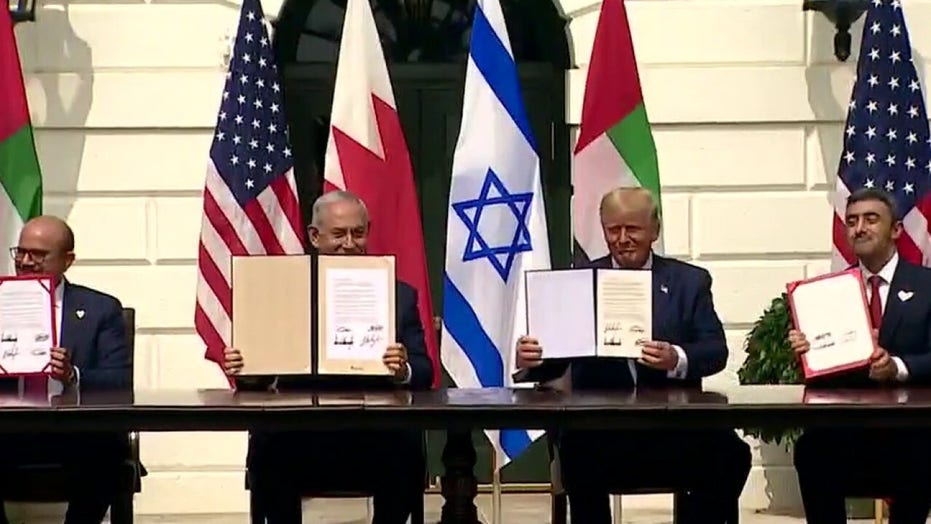Trump's Middle East Policy: Shifting Alliances And Regional Dynamics

Table of Contents
Withdrawal from the Iran Nuclear Deal and Renewed Sanctions
The Trump administration's withdrawal from the Joint Comprehensive Plan of Action (JCPOA), also known as the Iran nuclear deal, in 2018 marked a significant turning point in its Middle East policy. This decision, justified by the administration as necessary to curb Iran's nuclear ambitions and destabilizing regional activities, resulted in a renewed "maximum pressure campaign" against Iran.
- Increased tensions with Iran: The withdrawal immediately escalated tensions with Iran, leading to a series of confrontations and proxy conflicts across the region.
- Impact on regional security: The move destabilized an already volatile region, increasing concerns about the proliferation of nuclear weapons and regional conflicts. The Gulf Cooperation Council (GCC) nations, particularly wary of Iranian influence, found themselves increasingly reliant on the US for security guarantees.
- Repercussions for international relations: The unilateral withdrawal from the JCPOA damaged US credibility on the international stage and strained relations with key allies like the European Union, who remained committed to the agreement.
- Economic consequences of sanctions: The re-imposition of sanctions aimed to cripple Iran's economy, impacting its oil exports and access to international financial systems. However, the effectiveness of these sanctions was debated, with some arguing they inadvertently strengthened hardliners within the Iranian regime.
The rationale behind the withdrawal was rooted in concerns about the deal's sunset clauses and Iran's continued support for regional proxies. However, the implications for regional stability remain a subject of ongoing debate, with critics arguing the withdrawal emboldened Iran and undermined diplomatic efforts to contain its nuclear program.
Abraham Accords and Normalization of Relations
A landmark achievement of Trump's Middle East policy was the brokering of the Abraham Accords, a series of normalization agreements between Israel and several Arab nations. These agreements, signed in 2020, represent a significant shift in regional alliances and power dynamics.
- Normalization agreements between Israel and several Arab nations: The accords normalized relations between Israel and the United Arab Emirates (UAE), Bahrain, Morocco, and Sudan. These agreements involved the establishment of diplomatic ties, increased trade and cooperation, and a pledge to work towards regional peace.
- Shift in regional alliances and power dynamics: The accords signified a realignment of regional alliances, with some Arab states prioritizing shared strategic interests with Israel over the Palestinian issue.
- Impact on the Israeli-Palestinian conflict: While celebrated as a diplomatic breakthrough, the accords also raised concerns about their impact on the Israeli-Palestinian peace process, with some critics arguing they sidelined Palestinian aspirations for statehood.
- Long-term implications for peace in the region: The long-term implications of the Abraham Accords remain uncertain, but they have undoubtedly reshaped the regional geopolitical landscape and could potentially pave the way for further normalization efforts.
The motivations behind these agreements were multifaceted, including shared concerns about Iran, the desire to boost economic ties, and a strategic recalibration of alliances in the face of changing regional dynamics. Analyzing Israel-UAE relations, Israel-Bahrain relations, and the overall regional peace process is crucial to fully understanding the impact of this diplomatic breakthrough.
Shifting Alliances and the Changing Role of the US
Trump's Middle East policy led to significant shifts in US relationships with key regional actors, altering the balance of power and the perception of the US role in the region.
- Strained relations with traditional allies: The Trump administration's approach strained relations with some traditional allies, particularly those who disagreed with the withdrawal from the JCPOA or the policies towards Israel and the Kurds.
- Increased engagement with certain regional powers: The administration prioritized engagement with certain regional powers deemed more strategically aligned with its interests, including Saudi Arabia and Egypt.
- Impact on counter-terrorism strategies: The focus on counter-terrorism shifted from large-scale military interventions to a more targeted approach, utilizing drone strikes and support for regional partners in counter-terrorism efforts.
- The changing perception of the US role in the region: Trump's "America First" approach led to a perception that the US was disengaging from the region, creating uncertainty among allies and potentially emboldening rivals.
The administration's actions significantly altered the regional security architecture. Understanding US foreign policy under Trump and the implications for great power competition in the region is vital to comprehending the lasting impact of this period.
Focus on Counter-Terrorism
The Trump administration prioritized a more targeted counter-terrorism strategy, shifting from large-scale military interventions to increased reliance on drone strikes and support for regional partners.
- Increased military actions against terrorist groups: The administration authorized increased drone strikes and military operations against groups like ISIS and al-Qaeda, particularly in Syria and Iraq.
- Focus on regional partners in counter-terrorism efforts: The strategy heavily relied on partnerships with regional actors in the fight against terrorism, including sharing intelligence and providing logistical support.
- Evaluation of the success and failures of these strategies: The effectiveness of these strategies remains a matter of debate, with some arguing they reduced terrorist capabilities while others highlight unintended consequences, such as civilian casualties and the creation of new extremist groups.
The use of drones, targeted killings, and the level of military interventions remain points of discussion and analysis concerning the effectiveness of the approach.
Conclusion
Trump's Middle East policy fundamentally reshaped the region's geopolitical landscape. His withdrawal from the Iran nuclear deal, the brokering of the Abraham Accords, and his broader approach to alliances and counter-terrorism created significant shifts in regional dynamics. The lasting impacts of these decisions, from the altered balance of power to the evolving relationship between the US and its regional partners, continue to shape the Middle East today. Understanding Trump's Middle East policy is crucial for comprehending the current geopolitical landscape. Further research into the long-term consequences of these shifts in Trump's Middle East policy is essential for navigating the complexities of the region's future. Continue exploring the various facets of Trump's Middle East policy to gain a complete understanding of this transformative period in the region's history.

Featured Posts
-
 Official Spring Breakout 2025 Rosters Where To Find The Latest Updates
May 18, 2025
Official Spring Breakout 2025 Rosters Where To Find The Latest Updates
May 18, 2025 -
 I Ellada Os Pagkosmios Naytiliakos Igetis Prokliseis Kai Eykairies
May 18, 2025
I Ellada Os Pagkosmios Naytiliakos Igetis Prokliseis Kai Eykairies
May 18, 2025 -
 2025s Top Online Casinos In Canada A Look At 7 Bit Casino And Its Rivals
May 18, 2025
2025s Top Online Casinos In Canada A Look At 7 Bit Casino And Its Rivals
May 18, 2025 -
 Netflixs Top 10 Shift Romance Drama Replaced By True Crime
May 18, 2025
Netflixs Top 10 Shift Romance Drama Replaced By True Crime
May 18, 2025 -
 Ellinika Onomata Sti Lista Disekatommyrioyxon Toy Forbes Poioi Ksexorizoyn
May 18, 2025
Ellinika Onomata Sti Lista Disekatommyrioyxon Toy Forbes Poioi Ksexorizoyn
May 18, 2025
